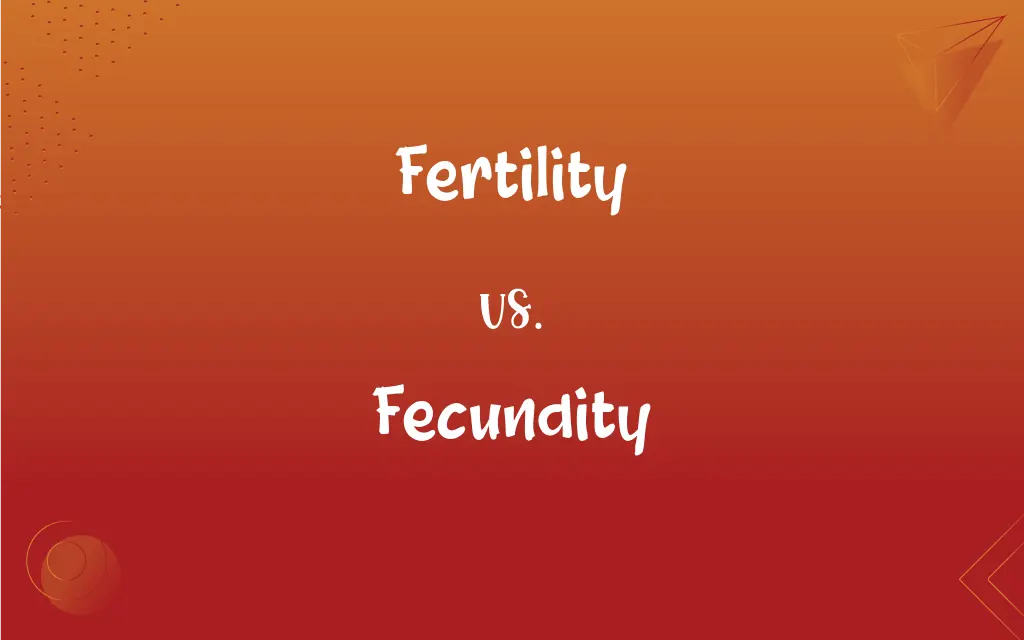Fertility vs. Fecundity: What's the Difference?
Edited by Aimie Carlson || By Janet White || Published on November 25, 2024
Fertility refers to the ability to conceive children, while fecundity is the potential reproductive capacity of an individual or population.

Key Differences
Fertility is a measure of actual reproductive performance, indicating how often individuals in a population or a specific individual can produce offspring. It's a practical assessment of an individual's or couple's ability to conceive and produce children. Fecundity, on the other hand, encompasses the biological potential for reproduction, irrespective of whether that potential is realized. It's about the possible reproductive capacity, not necessarily the actual reproductive outcomes.
Fertility focuses on the actual number of offspring produced, fecundity deals with the potential for reproduction. Fertility rates are influenced by a variety of factors including health, lifestyle, and age, reflecting real-world reproductive outcomes. Fecundity, conversely, is more about the theoretical maximum number of offspring that could be produced if all conditions were optimal.
Fertility assessments are often used in medical, demographic, and social sciences to understand trends in population growth, health issues related to reproduction, and the effectiveness of fertility treatments. Fecundity, as a broader concept, is used in biology and ecology to assess the maximum reproductive capability of a species or an individual, which might be affected by genetic, environmental, and physiological factors.
Fertility can be affected by societal and environmental factors, such as access to healthcare, cultural practices, and exposure to pollutants, which may decrease an individual's or population's reproductive output. Fecundity, being a measure of potential, assumes an ideal state without these external pressures. It's a theoretical limit rather than an observed rate.
The interplay between fertility and fecundity highlights the complexity of reproduction, encompassing both the potential for and the actual production of offspring. While fecundity provides a theoretical framework for understanding reproductive potential, fertility offers a grounded perspective on actual reproductive outcomes within specific contexts.
ADVERTISEMENT
Comparison Chart
Definition
Ability to conceive and produce offspring.
Potential reproductive capacity.
Measurement
Actual reproductive performance.
Theoretical reproductive capability.
Influencing Factors
Health, lifestyle, age, social, and environmental factors.
Genetic, environmental, and physiological potential.
Context of Use
Medical, demographic, social sciences.
Biology, ecology.
Focus
Actual number of offspring produced.
Maximum possible number of offspring.
ADVERTISEMENT
Fertility and Fecundity Definitions
Fertility
A measure of how fertile soil is.
The fertility of the valley's soil makes it perfect for vineyards.
Fecundity
The potential reproductive capacity of an individual or species.
The fecundity of the fish species ensures its survival despite predators.
Fertility
The natural capability to produce offspring.
High fertility rates in the region contribute to rapid population growth.
Fecundity
Biological capability to reproduce multiple times.
The insect's fecundity rates are incredibly high, leading to swarms each season.
Fertility
The ability of a person or animal to reproduce.
Advances in medicine have helped many overcome fertility issues.
Fecundity
A measure of how prolific or generative something can be.
The artist's fecundity is shown in her vast and varied collection of works.
Fertility
A quality of being fruitful or productive.
The fertility of her imagination is evident in her diverse portfolio of work.
Fecundity
The ability to produce an abundance of offspring or new growth.
The fecundity of the rabbit population presents a challenge for management.
Fertility
The rate at which something produces or yields results.
The fertility of the research team's efforts led to breakthroughs in multiple areas.
Fecundity
The innate potential for growth or reproduction.
The fecundity of the soil after the rainy season promises a bountiful harvest.
Fertility
The condition, quality, or degree of being fertile.
Fecundity
The quality or power of producing abundantly; fruitfulness or fertility.
Fertility
The birthrate of a population.
Fertility
(uncountable) The condition, or the degree, of being fertile.
Muckspreading increases the fertility of the soil.
Fertility
(countable) The birthrate of a population; the number of live births per 1000 people per year.
Fertility
The average number of births per woman within a population.
Fertility
The state or quality of being fertile or fruitful; fruitfulness; productiveness; fecundity; richness; abundance of resources; fertile invention; quickness; readiness; as, the fertility of soil, or of imagination.
And all her husbandry doth lie on heapsCorrupting in its own fertility.
Thy very weeds are beautiful; thy wasteMore rich than other climes' fertility.
Fertility
The ratio of live births in an area to the population of that area; expressed per 1000 population per year
Fertility
The state of being fertile; capable of producing offspring
Fertility
The property of producing abundantly and sustaining growth;
He praised the richness of the soil
FAQs
Can fecundity change over time?
Yes, fecundity can change due to age, health, and environmental conditions affecting biological potential.
Is fertility the same in all populations?
No, fertility rates vary widely among different populations due to cultural, environmental, and socio-economic factors.
What is fertility?
Fertility is the actual ability of an individual or population to produce offspring.
How do health factors affect fertility?
Health factors like nutrition, diseases, and lifestyle choices can significantly impact fertility by affecting reproductive function.
What is fecundity?
Fecundity is the potential reproductive capacity of an individual or population.
How is fecundity measured?
Fecundity is measured in theoretical terms, often using biological and ecological models to estimate reproductive potential.
What role does age play in fertility and fecundity?
Age affects both fertility and fecundity, with reproductive potential generally declining with age in both males and females.
What's the difference between fertility rate and birth rate?
Fertility rate refers to the number of children born to a woman or population, while birth rate is the number of live births per 1,000 people in a population.
How do environmental factors influence fecundity?
Environmental factors like pollutants, habitat destruction, and climate change can reduce fecundity by affecting reproductive health and capacity.
Can fertility treatments increase fecundity?
Fertility treatments aim to improve fertility outcomes, not directly increase fecundity, which is a broader measure of potential.
What is a fertility specialist?
A fertility specialist is a doctor who diagnoses and treats disorders related to reproduction, helping individuals or couples conceive.
Can a person have high fecundity but low fertility?
Yes, a person can have high reproductive potential (fecundity) but experience barriers to pregnancy (fertility), such as health issues or lifestyle factors.
What impact does pollution have on fertility?
Pollution can harm fertility by affecting hormonal balance, reproductive health, and sperm/egg quality.
How does fecundity relate to species survival?
High fecundity can enhance species survival by increasing the chances of offspring surviving to adulthood.
How do climate changes affect fecundity and fertility?
Climate change can affect fecundity and fertility by altering living conditions and resources needed for reproductive success.
How does lifestyle affect fertility?
Lifestyle factors like diet, exercise, substance use, and stress levels can positively or negatively affect fertility.
Is there a genetic component to fertility?
Yes, genetics play a significant role in determining an individual's fertility through traits affecting reproduction.
Can societal factors influence fertility?
Societal factors like marriage age, family planning policies, and economic conditions can significantly influence fertility rates.
Can fecundity be improved?
While genetic factors set limits, improvements in health and environment can potentially maximize an individual's fecundity.
What is the biological basis of fecundity?
The biological basis of fecundity includes genetic, physiological, and environmental factors that determine reproductive capacity.
About Author
Written by
Janet WhiteJanet White has been an esteemed writer and blogger for Difference Wiki. Holding a Master's degree in Science and Medical Journalism from the prestigious Boston University, she has consistently demonstrated her expertise and passion for her field. When she's not immersed in her work, Janet relishes her time exercising, delving into a good book, and cherishing moments with friends and family.
Edited by
Aimie CarlsonAimie Carlson, holding a master's degree in English literature, is a fervent English language enthusiast. She lends her writing talents to Difference Wiki, a prominent website that specializes in comparisons, offering readers insightful analyses that both captivate and inform.







































































